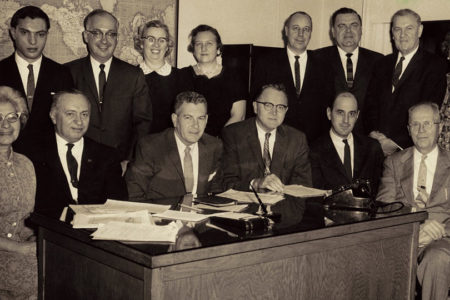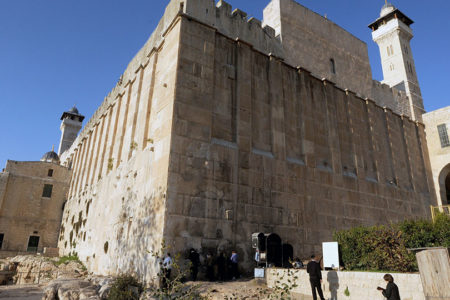Israel: Still the Apple of God’s Eye Part One
It is impossible to examine the basic truths of the Bible and omit the nation of Israel. Israel is central to what the Bible has to say about so many things and is key to our salvation.
A bird’s-eye view of Israel’s history enables us to understand what lies ahead for the world. God formed the nation for His glory. The calling and fashioning of three of Israel’s greatest leaders illustrate both Israel’s creation from obscurity and what God is seeking from all men.
Israel’s Selection
Abraham, Man of Faith. Throughout Scripture, Abram (later called Abraham) is recognized as the symbol of faith and is credited with being the “father of faith” because he evidenced trust in God. God appeared to Abram in Ur of the Chaldeans (Gen. 11:24—12:1–3).
According to Joshua 24:2, Abram and his family were idol worshipers. God did not call them because they were commendable in His sight; but, rather, He reached out to them just as He reaches out to us. He lifts us out of our sin, idolatry, and spiritual death and hostility and calls us to Himself. So God called Abram out of idolatry.
He called him to the land of Canaan and made him a promise:
Now the Lᴏʀᴅ had said to Abram: “Get out of your country, from your family and from your father’s house, to a land that I will show you. I will make you a great nation; I will bless you and make your name great; and you shall be a blessing. I will bless those who bless you, and I will curse him who curses you; and in you all the families of the earth shall be blessed”(Gen. 12:1–3).
This famous passage of Scripture is known as God’s covenant with Abraham. This covenant underlies all of the relationships with the nation of Israel for the rest of its history.
The Abrahamic Covenant contains three promises: land, seed (offspring), and blessing. So God brought the nation of Israel into existence by bringing someone out of one country and into an entirely different country and giving him land, seed, and blessing. Abraham illustrates that “without faith it is impossible to please Him” (Heb. 11:6).
Moses, Man of Revelation. Next the Bible tells us that God called Moses. He, more than any other person in the Old Testament, received revelation from God and passed it on to Israel. He, too, was called out of a place of death. Pharaoh had ordered all Jewish infant boys killed (Ex. 1:15–16). Pharaoh’s daughter drew Moses from the Nile River where his mother had placed him in a little basket, hoping to save his life. Pharaoh’s daughter raised Moses as her son.
After 40 years in Egypt, he murdered an Egyptian in an attempt to help his brethren and then fled to the wilderness where he spent another 40 years waiting on God. Then, in Exodus 3, God appeared to Moses in a burning bush and called him to be the agent for redeeming the nation of Israel.
The Israelites traveled through the Red Sea and the wilderness to Mount Sinai and spent about a year camped at Mount Sinai. That is when the Tabernacle was built. That is when Moses received God’s revelation, the Law—the Ten Commandments—recording all of that information for us. That work formed the foundation of the Levitical system on which the entire Old Testament is built.
So Moses became Israel’s greatest statesman-prophet. In Deuteronomy we read that God would raise up a prophet like Moses one day to deliver His people. Moses, the great mediator of the Law, illustrates that “man shall not live by bread alone; but man lives by every word that proceeds from the mouth of the Lᴏʀᴅ” (Dt. 8:3).
David, Man of Worship. David was Israel’s first major king. He was called while shepherding sheep in the hills. To many in the Middle East, shepherding is a despised occupation.
David was the youngest of Jesse’s eight sons and was often picked on by his brothers. Yet when Samuel went to Jesse to anoint a king, God made it clear He had chosen David (1 Sam. 16:8–12). Scripture says God looks on the heart, not on the outward appearance (v.7). So God chose David to become the shepherd of Israel. He was, according to 1 Samuel 13:14, a man after God’s own heart.
With David, God established what we call the Davidic dynasty. As with Abraham, God made David a promise: His kingdom will endure forever. It will be established in perpetuity (2 Sam. 7:16).
Overwhelmed with thanksgiving, gratitude, and awe, David then entered the Lord’s presence to worship Him (vv. 18–29). And so David is called “the sweet psalmist of Israel” (2 Sam. 23:1). It was David who led the procession to bring the Ark of the Covenant to a resting place in the city of Jerusalem. And as sweet psalmist, he led God’s people in worship and provided for the expression of worship. David illustrates that “true worshipers will worship the Father in spirit and truth; for the Father is seeking such to worship Him” (Jn. 4:23).
Thus Abraham laid the foundation of faith as he responded to the challenges to trust God. Moses led the people as he responded as a prophet to provide them with revelation and information from God. And David led the people in a search for the heart of God.







